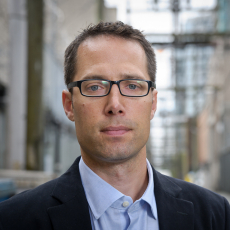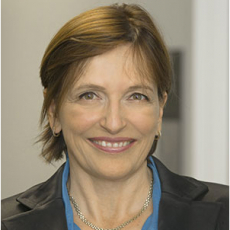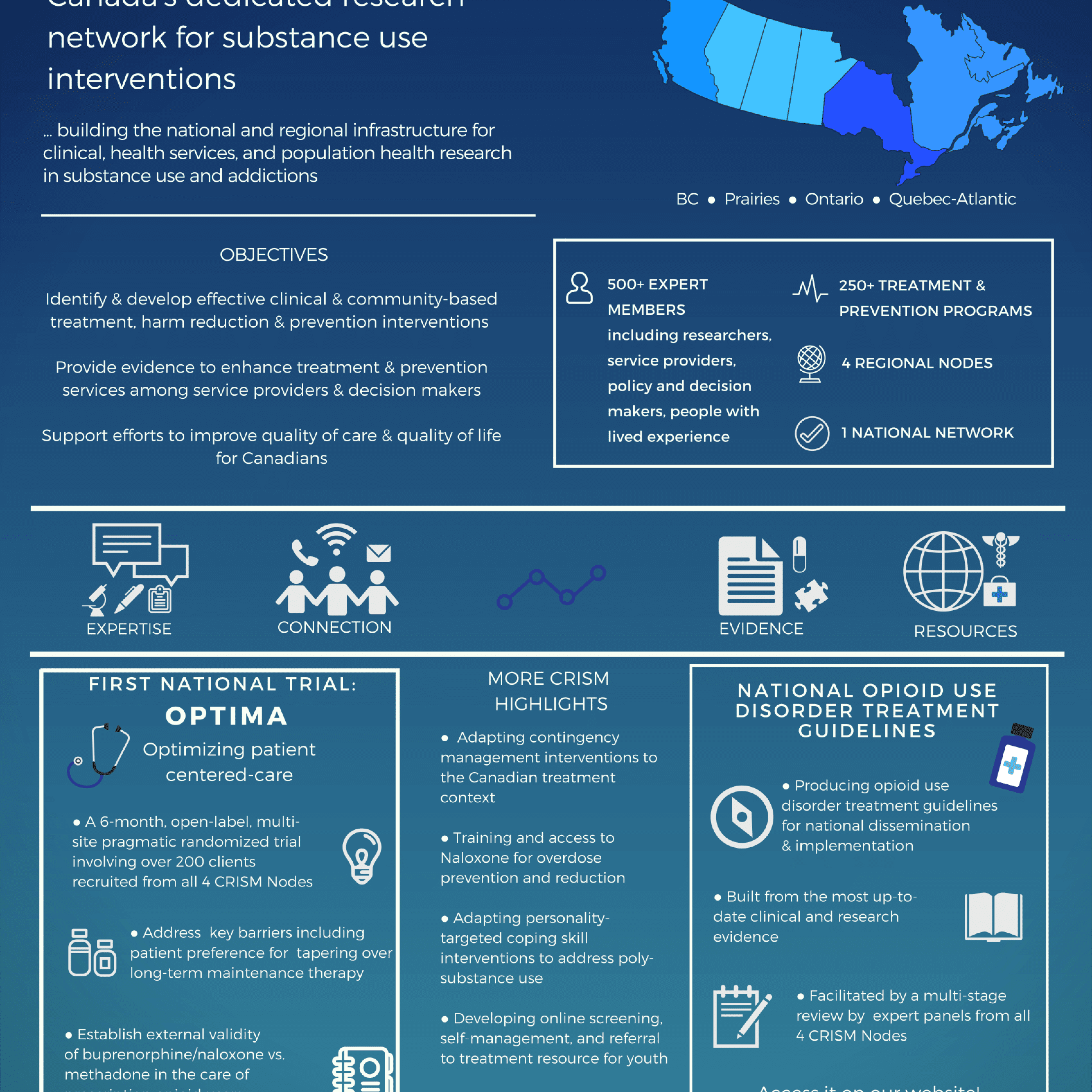Funded by the Canadian Institutes of Health Research (CIHR), the Canadian Research Initiative in Substance Matters (CRISM) is a national research consortium, of over 1400 members, focused on substance use disorders, comprising five large interdisciplinary regional teams (nodes) representing British Columbia, the Prairie Provinces and Territories, Ontario, Québec, and the Atlantic Provinces.
Each CRISM node is an expert network of research scientists, service providers, policy makers, community leaders, and people with lived experience of substance use disorders. CRISM’s mission is to translate the best scientific evidence into clinical practice and policy change. CRISM is a 5-year initiative and was modeled, in part, on the US National Institute on Drug Abuse’s Clinical Trials Network
CRISM was originally funded for 5 years and has been renewed for a further 6 years, beginning April 1, 2022
BRITISH COLUMBIA NODE

Dr. Evan Wood
The CRISM BC Node is led by Dr. Evan Wood, addiction medicine physician, clinician scientist and Professor of Medicine at the University of British Columbia. The BC Node is an interdisciplinary expert network of over 100 contributing members, including advocacy groups, policy makers, service providers, and research scientists. The network is affiliated with the BC Centre on Substance Use, the University of British Columbia, and Simon Fraser University, and other institutions, and works closely with regional health authorities and the provincial government. Through the translation of scientific evidence into practice and policy change, the network promotes evidence-based approaches to addiction treatment and provides training to the next generation of leaders through our comprehensive education programs.
To ensure that research priorities align with lived experience of those affected by substance use disorders, we have well-established partnerships with community and advocacy groups, including the BC Association of People on Methadone (BCAPOM), the Vancouver Area Network of Drug Users (VANDU), the Western Aboriginal Harm Reduction Society (WAHRS), From Grief to Action (FGTA), and Moms Stop the Harm. Our linkages to treatment providers, health system administrators and government policy-makers, our training infrastructure, and our national and international collaborations ideally position us to undertake collaborative research and implementation of evidence-based therapeutic approaches.
To learn more about the CRISM BC Node, click here.
PRAIRIES NODE

Dr. David Hodgins
The Prairie Node includes Alberta, Saskatchewan, and Manitoba, and is led by Dr. David Hodgins, Ph.D. Dr. Hodgins is a professor in the Program in Clinical Psychology in the Department of Psychology, University of Calgary and is also the Head, Department of Psychology. Excellent researchers from Alberta, Saskatchewan, and Manitoba are investigating substance misuse/addiction interventions delivered in clinics, the community, and academic research settings. Each province funds treatment and prevention of substance misuse/addiction and has developed strategic plans through their respective Ministries of Health and Regional Health Authorities. But to date these assets have operated either in isolation or as part of small provincial teams.
The CRISM Prairie Node already counts over 400 members, including investigators, system and program managers, policy makers, and consumer advocates, each of whom recognizes the need for enhanced regional collaboration to address substance misuse/addiction, and who have committed to participate in a Prairie regional CRISM Node.
To learn more about the CRISM Prairie Node, click here.
ONTARIO NODE

Dr. Jürgen Rehm
The Ontario Node, or OCRINT (Ontario CRISM Node Team), is led by Dr. Jürgen Rehm, Senior Scientist at the Institute for Mental Health Policy Research and the Campbell Family Mental Health Research Institute at the Centre for Addiction and Mental Health (CAMH) in Toronto. CAMH is Canada’s largest research and treatment hospital dedicated to mental health and substance use problems.
The Ontario Node is led by Dr. Rehm together with a team of Co-Principal Investigators and Knowledge Users. The Node is comprised of an integrated team of over 150 members including: academic investigators from institutions across Ontario, community-based intervention providers as well as system/policy representatives, next to people with lived experience.
To learn more about the CRISM Ontario Node, click here.
QUÉBEC NODE

Dr. Julie Bruneau
The Québec Node is led by Dr. Julie Bruneau, Professor at the University of Montréal. The Québec Node combines the expertise of researchers, clinicians, and knowledge users from Québec. Members aim to identify the specific needs and priorities and generate evidence-based knowledge according to real needs through research and collaborative projects. This node also contributes to the development of interventional research-based practices and policies with a Canada-wide perspective in mind, to ultimately improve quality of care and quality of life for all Canadians living with substance misuse.
Node members are working on multiple projects aimed at accelerating the transfer of scientific knowledge into better addiction treatment approaches, including both pharmaceutical and psychological interventions. In addition, they benefit from multidisciplinary expertise brought by the diversity of researchers, service providers, and service users who joined the node and are addressing the substance misuse issue from different angles. This vision has the potential to accelerate knowledge base translation into practice and ameliorate the health and well-being of persons living with substance misuse.
To learn more about the CRISM Québec Node, click here.
ATLANTIC NODE

Dr. Sherry Stewart
The CRISM ATLANTIC Node is led by Dr. Sherry Stewart. Dr. Stewart, FRSC, is a Canadian clinical psychologist. She is also a Professor of Psychiatry and Psychology at Dalhousie University and a Tier 1 Canada Research Chair in Addiction and Mental Health.
To learn more about the CRISM Atlantic Node, click here.

